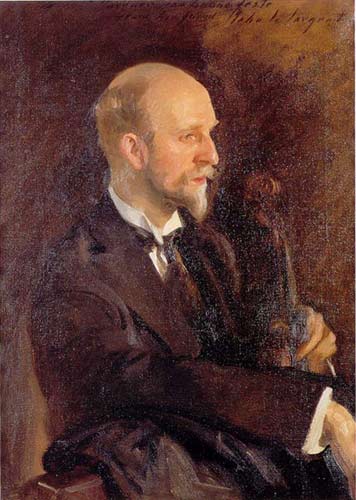
|
The farmer tramping over his grounds in Medfield, Massachusetts had a keen ear for nature that served him well in his other job as one of America’s leading composers.[1] Charles Martin Loeffler had come to America from Alsace in 1881 at the age of twenty.[2] For twenty years he played in the first violin section of the Boston Symphony, then devoted himself to[3] composing and farming. One friend recounts[4] that Loeffler’s sense of nature was as keen as his ear for music. Walking through his woods immersed in conversation, the composer would break off in mid-sentence and whisper, “see that fox!”[5] Or, passing a pond, take his companion by the arm and say, “watch that turtle raise his head.” Loeffler’s friend recalls that on a hot summer day in 1914 the composer and his wife and friends were gathered around the dinner table when Loeffler jumped up and said, “Listen to that bird! She’s in distress[6] —it must be a snake!” A hasty investigation found the bird fluttering frantically at the front door, which was adorned with leafy vines that hid a nest full of young birds.[7] One of Loeffler’s helpers reached into the vine and pulled out a long black snake. Once the snake had been killed, the mother bird flew back to comfort her agitated brood.[8] On one occasion, however, Leffler’s hearing was not so acute[9]. Word had it that a band of gypsies had been stealing things in the neighborhood. Loeffler swore that he would shoot the first trespasser he encountered on his property.[10] On a still and moonless night he was awakened by the sound of hooves[11] on the road that approached his house. Loeffler jumped from his bed, gun in hand, leaned out of the open window, and shouted at the unseen intruders, commanding them to respond at once and turn back[12] or be shot. On cue, out of the darkness, came the reply—a long, familiar moo.[13] Maybe it was keen senses—plus a touch of[14] imagination—that enabled Martin Loeffler to become one of America’s great composers. |
一位农夫正行走在马萨诸塞州梅菲镇的田野上,他敏锐地聆听着大自然的声音。这种灵敏的听觉也使他在自己的另一份职业上大有作为——成为美国最重要的作曲家之一。 1881年,20岁的查尔斯•马丁•罗伊弗雷从阿尔萨斯来到美国。20年来,他一直在波士顿交响乐团担任首席小提琴手,之后又从事作曲和农耕。据一位朋友讲述:罗伊弗雷对大自然和音乐都有着同样敏感的听力。走在树林里,即使沉浸在交谈中,这位作曲家也会突然中途停止谈话,悄声说:“快看那只狐狸!”或是经过池塘时,他会突然抓住同伴的手臂说:“快看,那只乌龟抬起头来了。” 罗伊弗雷的朋友回忆说,在1914年炎热夏季的一天里,作曲家和他的妻子,还有几个朋友,正围坐在餐桌前,突然罗伊弗雷跳起来,他说:“听,有只鸟在叫!她那么悲伤,周围一定有蛇!”大家很快前去查看,发现一只鸟在前门处正疯狂地拍打着翅膀,前门周围缠绕着茂密的葡萄藤,里面藏有一个载满雏鸟的鸟巢。罗伊弗雷的一个帮手把手伸进葡萄藤里,果真拽出了一条长长的黑蛇。蛇被杀死后,鸟妈妈飞回鸟巢安慰她那窝受惊的小鸟。 然而,有一次,罗伊弗雷的听觉却不那么灵敏了。据说,一伙吉普赛人一直在附近行窃。罗伊弗雷发誓要开枪打死第一个在自己地盘上碰到的闯入者。在一个宁静而漆黑的夜晚,他被路上响起的蹄声吵醒,响声正朝他家靠近。罗伊弗雷从床上跳起来,手里拿枪,靠在敞开的窗户上,冲着看不见的闯入者们大喊起来,命令他们立刻做出回应,并停止向前,否则就开枪了。恰在此时,从黑暗中传来了回应——长长而熟悉的一声牛哞。 或许正是这种敏锐的听觉,再加上一些想象力,才使得马丁•罗伊弗雷成为了美国伟大的作曲家之一。 (来源:英语学习杂志) |
|
Vocabulary: 1. tramp: 步行,长途跋涉;serve: 对……有用,促进。 2. Charles Martin Loeffler: 查尔斯•马丁•罗伊弗雷 (1861—1935),美国著名作曲家。主要作品:《交响乐团的诗》、《我的童年》和《五个爱尔兰幻想》等;Alsace: 阿尔萨斯,法国东北部一地区。 3. devote to: 从事……。 4. recount: 详细叙述,描述。 5. immerse: 沉浸,深陷于;break off: 突然停止,突然住口。 6. distress: 悲伤。 7. flutter: 振翅;frantically: 疯狂地;be adorned with: 用……装饰;vine: 葡萄藤。 8. agitated: 受惊的;brood: 一窝孵出的雏鸟(或雏鸡等)。 9. acute: 敏锐的。 10. trespasser: 擅自侵入者,闯入者;property: (包括工地上所建房屋在内的)地产,房地产。 11. hoof: (马等有蹄动物的)蹄。 12. turn back: 停止向前,折回,往回走。 13. on cue: 恰好在这时候;moo: 哞(指牛叫声)。 14. a touch of: 少许,一点。 |